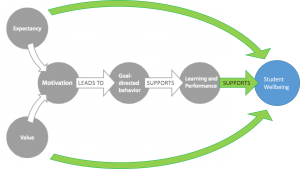Student wellbeing is supported when students are motivated to learn and feel that they are learning effectively.
From our analysis of the UES, focus group and interview data, we identified several ideas relating student wellbeing and their motivation to learn and their perceived effectiveness of learning. Student wellbeing is supported when:
- Students find the subject matter is interesting, relevant, or otherwise meaningful to them.
- Student find that the learning experience interesting, engaging and enjoyable.
- The course structure supports learning – that is, students understand how to succeed.
- The student feels they are learning effectively in class.
- The instructor support student learning outside of class.
These themes align with the concept of motivation presented in How Learning Works (Ambrose, 2010). According to Ambrose, “There are two important concepts that are central to understanding motivation: (1) the subjective value of a goal and (2) the expectancies, or expectations for successful attainment of that goal.” (2010, p. 69). Relating this to our findings, students are more motivated to learn when they find value in the material and the learning process (point 1 & 2 above), and when they believe that that they will learn effectively (points 3, 4 & 5 above).

The graphic above is adapted from Ambrose’ model (in grey) of how value and expectancy create motivation, drive goal-directed behaviour, and improve learning and performance. Our findings (in colour) suggest that that value, expectancy, and the attainment of the learning goal all contribute to student wellbeing.
Our analysis of the UES, focus group and interview data identified the following themes relating to students’ abilities and their motivation to learn effectively.
What are some ways you could help students find value in the subject matter?
This can be accomplished by connecting the material to world events, other courses, a student’s future career or other student interests.
Even if the subject matter isn’t particularly interesting to the students, students can still be motivated if the learning process is enjoyable. The vast majority of students report that an interactive learning process is more engaging, and fosters a sense of community and belonging which further increases motivation (a few students prefer passive learning environments).
What are some ways you could support student learning? How can we facilitate learning among students given that they expect to succeed in class?
Instructors can support student learning by:
- Delivering the material clearly and effectively in class (i.e. clear examples)
- Supporting students outside the classroom (i.e. office hours, responding to emails, providing extra resources)
- Being clear about the mechanics of the course (i.e. what needs to be handed in and where, structure of the exam, providing grading rubrics)
Do you agree with the teaching practices used to help support student learning in this post? Have you tried any of these strategies? Did they work? Did they not work? Feel free to share your thoughts in the comment section below.